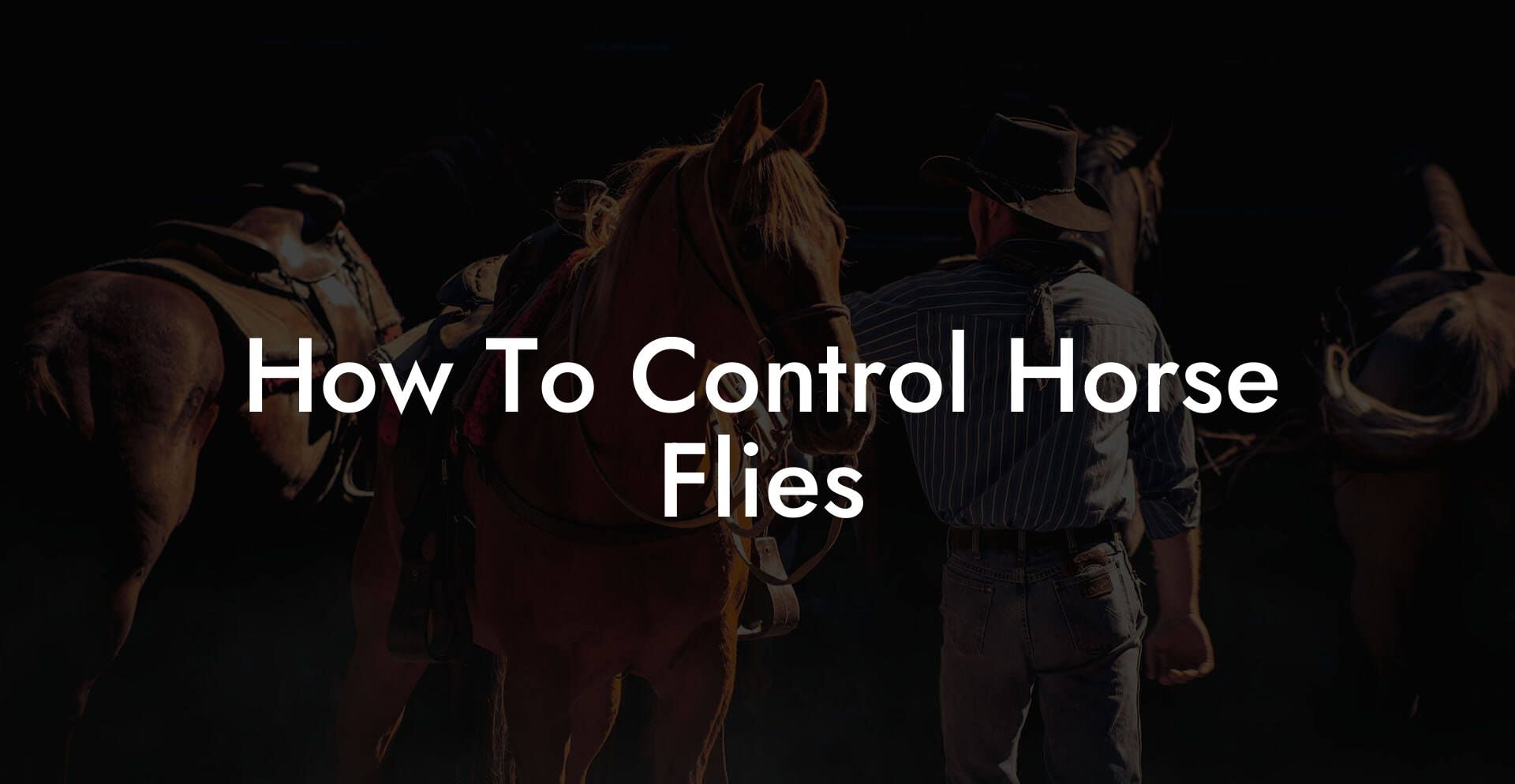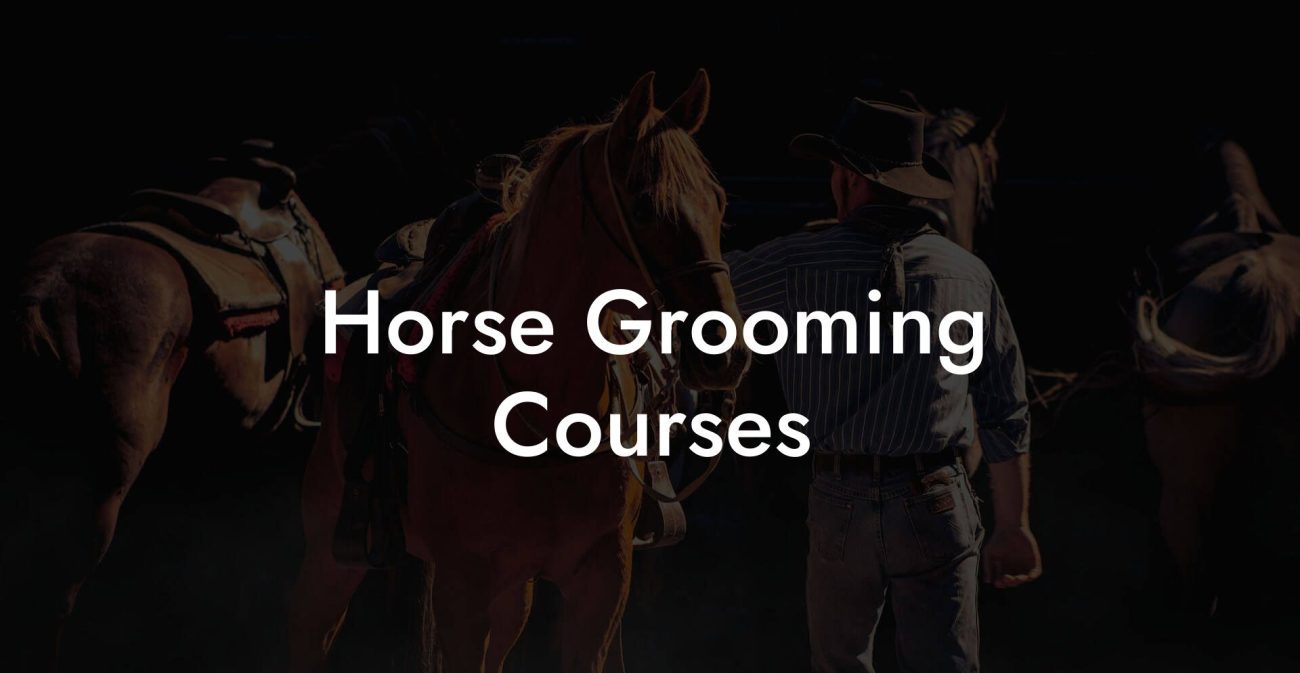Controlling horse flies might sound like an epic battle, but it’s really about outsmarting these pesky, airborne nuisances that relentlessly target our equine friends. If you’ve ever watched a horse flit around, landing uninvited on your prized mare or stubborn gelding just as they try to enjoy a sunny pasture, you know the struggle is real. In a world where Gen-Z and millennials are demanding smarter, more sustainable solutions for every aspect of life, including caring for their horses, this guide dives deep into every angle of horse fly control with a mix of practical know-how, modern tech hacks, and a dash of humor to boot.
Quick Links to Useful Sections
- Understanding Horse Flies: The Unwanted VIPs of Your Pasture
- The Lifecycle of Horse Flies: Knowing Your Foe
- Strategic Environmental Management: Preventing the Breeding Ground
- Optimizing Pasture Drainage
- Regular Cleanup and Debris Removal
- Adjusting Pasture Rotations
- Water Source Management
- DIY and Natural Remedies: Eco-Friendly Solutions for Modern Horse Owners
- Herbal Repellents and Essential Oils
- DIY Fly Traps
- Planting Fly-Repellent Vegetation
- Chemical Controls: The Science-Backed Arsenal
- Insecticides and Repellents
- Strategic Timing of Applications
- Physical Barriers and Modern Tech Innovations: High-Tech Defenses for the Digital Age
- Fly Sheets and Leg Wraps
- Portable Fans and Air Curtains
- Electronic Fly Repellers
- Integrated Pest Management (IPM): A Holistic Approach to Horse Fly Control
- Expert Tips and Modern Strategies to Master Horse Fly Control
- Real-Life Success Stories: Riders Who’ve Outsmarted the Flies
- The Eco-Warrior Stable
- Tech-Forward Tack: Merging Tradition with Innovation
- Small Farm, Big Impact
- Resources and Community Support: Your Next Steps in Horse Fly Control
- Join Local and Online Equine Communities
- Consult with Equine Veterinarians and Pest Management Experts
- Attend Workshops and Webinars
- Explore Government and Nonprofit Resources
- Tailoring Your Strategy: Combining Methods for Long-Term Success
- Frequently Asked Questions about Controlling Horse Flies
- The Journey Ahead: Mastering Horse Fly Control for a Healthier Equine Life
Understanding Horse Flies: The Unwanted VIPs of Your Pasture
Horse flies aren’t your average garden-variety insect; they’re buzzing parasites with a serious knack for causing discomfort and stress (not to mention potential health risks) for your horse. These biting flies, belonging to the Tabanidae family, aren’t just irritating, they’re also persistent, attracted by the warmth and movement of horses, and yes, even the irresistible scent of sweat.
Before you launch your war against them, it’s crucial to understand the enemy. Horse flies are known for their painful, mobile bites that can lead to inflammation and even secondary infections if your horse scratches or rubs the irritated area. With their spongy mouthparts, they can also transmit diseases from one host to another. In short, their presence is a double-edged sword of irritation and risk.
But fear not, a deep dive into the biology, habits, and breeding patterns of horse flies arms you with the knowledge needed to control, deter, and eventually outsmart them. In the following sections, we’ll explore everything from environmental management and natural repellents to chemical and technological interventions designed specifically to reduce the burden of these airborne assailants.
The Lifecycle of Horse Flies: Knowing Your Foe
To develop an effective control strategy, it’s essential to know where horse flies come from and how they thrive. Understanding their lifecycle is the first step in outsmarting them:
- Egg Stage: Female horse flies lay eggs on damp soil or near bodies of water where the larvae are most likely to find food. This stage is typically the best time to get ahead of infestations through proper environmental management.
- Larval Stage: Once hatched, the larvae live in moist environments, feeding on organic matter. Their survival depends on favorable conditions such as high humidity and a steady supply of decaying vegetation.
- Pupal Stage: During this period, the larva transforms into a pupa. Disrupting this stage can dramatically reduce the number of adult flies emerging in your pasture.
- Adult Stage: Adult horse flies emerge, ready to bite and breed. Their short lifespan makes them especially active during warm, sunny days, which is prime time for your horse to experience discomfort.
By targeting specific stages of the lifecycle, especially the breeding grounds and habitats where larvae thrive, you can significantly reduce the overall population of these pests.
Strategic Environmental Management: Preventing the Breeding Ground
When it comes to keeping horse flies at bay, a proactive approach centered around environmental management is critical. Think of it as pest-proofing your horse’s real estate. Here are the top strategies:
Optimizing Pasture Drainage
Horse flies love moisture, especially in stagnant water. Ensuring your pasture and barn grounds are well-drained can make a huge difference in curbing the ideal breeding conditions for these pests. If you notice puddles or poorly drained areas, consider installing drainage systems or regrading the area.
Regular Cleanup and Debris Removal
Organic debris and decaying vegetation provide the perfect environment for larvae to thrive. A regular cleanup schedule, collecting manure, fallen leaves, and decayed plant matter, can disrupt the lifecycle of horse flies by eliminating their food source.
Adjusting Pasture Rotations
Rotational grazing isn’t just good practice for soil health, it also helps manage pest populations. By moving your horses around and giving sections of your pasture time to rest and recover, you also break up the continuity of fly breeding cycles.
Water Source Management
In many stables and paddocks, watering systems or natural water bodies can become breeding hotspots. Regularly cleaning and maintaining water troughs, and ensuring that water does not stagnate, can make your pasture much less inviting to horse flies.
DIY and Natural Remedies: Eco-Friendly Solutions for Modern Horse Owners
In today’s world, where eco-conscious choices guide our decisions, natural and DIY remedies are popular among Gen-Z and millennial horse owners. Not only are these solutions kinder to the environment, but they also tend to be gentler on your horse’s skin and overall health.
Herbal Repellents and Essential Oils
Nature offers a host of repellents in the form of essential oils and herbal extracts. Oils like eucalyptus, lavender, citronella, and peppermint have natural insect-repelling properties. Some horse owners create custom sprays by diluting these oils with water and a touch of vegetable glycerin to help them adhere to the horse’s coat.
While these natural remedies may not offer 100% protection, their pleasant aroma and eco-friendly credentials make them a favourite among modern equestrians looking for a chemical-free option.
DIY Fly Traps
If you’re up for a bit of crafting, making your own horse fly traps can be both fun and effective. Simple traps can be made using a translucent container filled with a mixture of water, sugar, and a splash of dish soap. The idea is to lure the flies in with the sweet scent, and once they land on the soapy surface, they get trapped.
For a more creative twist, consider using hanging fly traps painted with bright colors that mimic natural attractants for these insects. These DIY projects not only reduce the fly burden but can add a quirky, personal touch to your stable management routine.
Planting Fly-Repellent Vegetation
Surrounding your pasture with plants that naturally repel insects is another green strategy. Plants like marigold, basil, and mint are known for their fly-repelling properties. Creating a botanical barrier around feeding or resting areas can act as an added layer of defense.
Not only do these plants serve a functional purpose, but they also add a splash of color and life to your stable environment, making them a win-win for aesthetics and practicality.
Chemical Controls: The Science-Backed Arsenal
Sometimes, despite your best natural efforts, you might need a more robust solution. Chemical controls, when used responsibly, can be an essential part of an integrated horse fly management plan.
Insecticides and Repellents
A variety of insecticides are on the market that target adult horse flies. These products are often available as sprays or spot treatments that can be applied to your horse’s coat or the surrounding area. When using chemical treatments, it’s crucial to follow label instructions carefully, not just for the safety of your horse, but also for the environment.
Repellents are another chemical-based option, often containing ingredients like permethrin. This synthetic chemical mimics natural pyrethrins found in chrysanthemum flowers and works by disrupting the nervous system of the insects, effectively repelling them.
Strategic Timing of Applications
Timing is everything, and this holds true for chemical applications as well. Applying insecticides during the early morning or late evening, when horse flies are less active, can maximize the treatment’s effectiveness while minimizing exposure to both your horse and beneficial insects.
Always remember that chemical solutions should be part of a broader management plan, used judiciously to complement natural and mechanical methods.
Physical Barriers and Modern Tech Innovations: High-Tech Defenses for the Digital Age
Enter the realm of physical barriers, where technology meets tradition in your battle against horse flies. For those who appreciate smart, modern solutions, several innovations can drastically reduce fly encounters.
Fly Sheets and Leg Wraps
Much like our own fashionable yet functional raincoats, fly sheets and leg wraps serve as protective gear for horses. Designed with lightweight, breathable, and insect-repellent materials, these coverings keep horse flies at bay by creating a physical barrier between the animal’s skin and the pest.
Fly sheets come in various styles, some of which are now equipped with UV protection and moisture-wicking technology, a nod to modern fabric innovations that ensure your horse stays cool and comfortable even in the heat of battle.
Portable Fans and Air Curtains
Believe it or not, a strong breeze is a natural fly deterrent. Portable fans strategically placed in stables or even in open-field settings can create micro-environments that blunt the flies’ flight. Air curtains installed at entryways of barns help keep the pest from invading indoor spaces.
These technological solutions are especially appealing to the tech-savvy equestrian community, which values sustainability and efficiency. A few well-placed fans and air curtains can lead to a noticeable reduction in horse fly activity.
Electronic Fly Repellers
Electronic fly repellers are yet another innovation on the scene. These devices emit ultrasonic frequencies that are unpleasant for horse flies, deterring them from coming near your horses. While the research on ultrasonic repellents is ongoing, many horse owners have reported success with these gadgets as an additional control measure.
Combining electronic repellers with physical barriers creates a multi-layered defense system that appeals to modern sensibilities, high-tech, minimally invasive, and environmentally conscious.
Integrated Pest Management (IPM): A Holistic Approach to Horse Fly Control
Integrated Pest Management (IPM) is not just a fancy acronym, it’s a comprehensive, multi-pronged strategy that combines all of the aforementioned methods into a cohesive plan. IPM isn’t about relying on any single trick; it’s about deploying a variety of tools and techniques to manage horse fly populations sustainably.
The core principles of IPM include:
- Prevention: Modify the environment to reduce breeding opportunities.
- Monitoring: Regularly assess horse fly populations and monitor the effectiveness of your interventions.
- Intervention: Apply chemical treatments, physical barriers, or natural remedies as needed, based on data and seasonal patterns.
- Sustainability: Strive to minimize adverse effects on your horse, beneficial insects, and the environment at large.
With IPM, your goal is to achieve a balanced ecosystem where horse flies are controlled without creating collateral damage. Understanding and applying these principles requires a bit of detective work, identifying the weak links in the pest’s lifecycle and then strategically intervening at the right moments.
For example, an effective IPM plan might involve routine environmental cleanups in the early spring, the application of targeted repellents during peak fly season, and the use of electronic fly repellers in stables. Together, these tactics create a resilient plan that adapts to changing conditions and minimizes reliance on any single product or method.
Expert Tips and Modern Strategies to Master Horse Fly Control
Whether you’re a first-time horse owner or a seasoned equestrian veteran, these expert tips will help you stay one step ahead of horse flies:
- Rotate Your Strategies: Don’t rely on one method alone; mix natural remedies, physical barriers, and chemical controls for a robust defense.
- Stay Informed: Keep up with emerging technologies and research in pest management. Modern solutions, such as smart sensors and real-time monitoring apps, provide valuable insights into field conditions.
- Customize Your Approach: Each horse and each pasture is unique. Tailor your control measures to the specific needs of your environment and your equine companion.
- Engage with the Community: Join online forums, social media groups, or local equestrian clubs. Sharing experiences and strategies can open up new avenues to explore and troubleshoot challenges together.
- Document Your Efforts: Keeping a journal or using digital apps to record pest activity and control measures will help you identify patterns and refine your approach over time.
Remember, the goal isn’t just to eliminate horse flies for a season, it’s to establish a long-term, sustainable model of care that ensures your horse remains happy, healthy, and fly-free. With a blend of science, natural ingenuity, and modern tech, you’re well on your way to mastering the art of horse fly control.
Real-Life Success Stories: Riders Who’ve Outsmarted the Flies
True inspiration often comes from those who have faced the challenge head-on and emerged victorious. Across the country, equestrians have implemented a range of innovative strategies that have yielded impressive results.
The Eco-Warrior Stable
At a progressive equestrian center in the Pacific Northwest, the stable management team decided to overhaul their approach to horse fly control entirely. Combining a strict environmental management plan with natural repellents and DIY fly traps, they were able to cut down fly numbers by over 80% in just one season. The team also incorporated periodic pasture rotations and installed strategically placed fans in their barn. They now regularly share their best practices on social media, inspiring a new generation of eco-conscious horse owners.
Tech-Forward Tack: Merging Tradition with Innovation
In the heart of Texas, a group of millennial horse enthusiasts harnessed modern technology to create an integrated pest management system unlike any other. By installing electronic fly repellers in their stalls, using data-driven apps to monitor fly activity, and maintaining a routine of natural cleaning and pasture care, they’ve not only minimized the discomfort of their horses but also set a new standard for smart stable management. Their willingness to blend tradition with tech has made headlines in equine circles and proves that even the most stubborn pests can be defeated with ingenuity.
Small Farm, Big Impact
On a modest farm in the Midwest, a family that had been battling horse flies for years took a personal approach by combining herbal repellents with environmental adjustments. They planted rows of fly-repellent vegetation around grazing areas, constructed simple yet effective wind barriers, and even involved the whole community in maintaining a clean, debris-free environment. Their success story is a testament to what can be achieved when practicality meets passion, demonstrating that even small farms can develop a sustainable, community-driven solution to an age-old problem.
These stories serve as a reminder that effective horse fly control isn’t reserved for large commercial operations; with creativity, determination, and a willingness to adapt, every horse owner can create a more comfortable, healthier environment for their equine companions.
Resources and Community Support: Your Next Steps in Horse Fly Control
As you embark on or refine your journey to control horse flies, remember that you’re not alone. A vibrant community of equestrians, veterinarians, and pest management experts is ready to share advice, success stories, and the latest innovations. Here are some key resources and community support mechanisms to help steer your efforts:
Join Local and Online Equine Communities
Social media groups, online forums, and local riding clubs are treasure troves of practical tips and firsthand experiences. Platforms like Facebook, Reddit, and specialized equestrian websites offer spaces where you can ask questions, share your journey, and stay updated on new techniques in horse fly control.
Consult with Equine Veterinarians and Pest Management Experts
Animal health professionals and pest control experts are invaluable allies. Many local veterinarians have insights into the best practices for managing horse fly infestations, and they can tailor recommendations to the unique needs of your horse and your local environment.
Attend Workshops and Webinars
With the growing interest in sustainable pest management, numerous workshops and online seminars now focus on integrated pest management strategies. These events offer an excellent opportunity to learn from the experts, discover innovative products, and network with other forward-thinking horse owners.
Explore Government and Nonprofit Resources
Many state agricultural extensions and environmental agencies provide free resources, guidelines, and even grants for sustainable pest control initiatives. Tapping into these resources can provide you with additional data and expert recommendations tailored to your region.
Armed with the right information, community backing, and an open mind, you’re set to take decisive steps toward a more comfortable, fly-free environment for your horse.
Tailoring Your Strategy: Combining Methods for Long-Term Success
No single approach is a silver bullet when it comes to controlling horse flies. Successful management is all about tailoring a strategy that incorporates several methods. Whether you’re leveraging natural repellents, embracing smart tech solutions like electronic fly repellers, or adapting your daily routine with environment-focused practices, your strategy should be dynamic and adaptable.
The secret is to start small, test different methods, and monitor their effectiveness. Perhaps you begin with DIY fly traps and optimized pasture drainage, then gradually add in fly sheets, natural repellents, and community-supported initiatives. Document your progress and adjust based on seasonal changes and local fly behavior. Over time, this layered approach will build a resilient defense that offers continuous relief for your horse.
Remember, managing horse flies is an ongoing process that demands vigilance and creativity. With every adjustment you make, you’re not only protecting your horse from discomfort but also contributing to a healthier, more sustainable farming ecosystem.
Frequently Asked Questions about Controlling Horse Flies
Here are some commonly asked questions that capture key concerns and strategies about managing horse flies effectively:
1. What are the most effective natural methods to control horse flies?
Many horse owners find success in using natural repellents such as essential oils (eucalyptus, citronella, lavender) and herbal sprays. Additionally, planting fly-repellent vegetation and constructing DIY fly traps are both effective eco-friendly solutions.
2. When is the best time to apply chemical treatments?
The optimal time to apply insecticides and repellents is during the early morning or late evening when horse flies are less active. This minimizes exposure and enhances the treatment’s efficacy.
3. How do physical barriers like fly sheets help in controlling horse flies?
Fly sheets and leg wraps act as a direct barrier between the horse's skin and the flies. They are made of breathable, insect-repellent fabrics that not only protect the horse but also provide UV protection and moisture control.
4. Can environmental management alone be enough to control horse flies?
While optimizing drainage and regularly cleaning up debris are crucial first steps, combining these practices with natural remedies, physical barriers, and occasionally chemical treatments ensures more comprehensive control.
5. Are electronic fly repellers safe and effective?
Yes, electronic fly repellers are generally safe for both horses and humans. They emit ultrasonic frequencies that deter horse flies and can be a great addition to your integrated pest management strategy.
6. How can I monitor the effectiveness of my horse fly control plan?
Keeping a detailed log of fly sightings, tracking the frequency of horse fly bites, and using monitoring tools available in some modern repellent devices can help gauge the effectiveness of your control measures.
7. What should I do if my horse shows signs of irritation after using a repellent?
Discontinue the product immediately and consult with your veterinarian. Opt for patch testing new products on a small area before applying thoroughly.
8. Is there a one-size-fits-all solution for controlling horse flies?
Not really. Every pasture and horse is unique, which means your strategy should be adaptable based on environmental conditions and your horse’s specific needs.
9. Can integrated pest management (IPM) really reduce horse fly populations in the long term?
Yes, by combining environmental management, biological control methods, physical barriers, and, when needed, chemical treatments, IPM creates a sustainable, long-term strategy to keep horse fly populations in check.
10. Where can I find more information about eco-friendly horse fly control methods?
Check out local agricultural extension services, equine management workshops, reputable online equestrian communities, and government resources that focus on sustainable farming and pest management.
The Journey Ahead: Mastering Horse Fly Control for a Healthier Equine Life
Your horse is more than just an animal; it’s a partner, a friend, and, for many, a lifestyle. Taking control of horse fly infestations isn’t just about keeping pests at bay, it’s about preserving your horse’s comfort, safety, and happiness. Harnessing a combination of natural remedies, chemical treatments, environmental adjustments, and cutting-edge technology will lead you to innovative, sustainable solutions that fit seamlessly with your active lifestyle.
Whether you’re a millennial hopping on the latest eco-friendly trends or a Gen-Z rider eager to combine tradition with tech, the strategies outlined in this guide empower you to create a robust, personalized horse fly control plan. Celebrate small victories along the way, share your experiences within the exciting equestrian community, and keep an open mind as you refine your techniques. Each effort contributes not only to reducing the nuisance of horse flies but to a broader commitment to animal welfare.
Embrace the challenge with determination and wit, knowing that every smart decision, from installing a portable fan to crafting your own herbal repellent, brings you one step closer to a calmer, more comfortable life for your horse. The journey of mastering horse fly control is a marathon, not a sprint, but with every innovative idea and sustained effort, you’re transforming your stable and pasture into a sanctuary of well-being.
Step confidently into this optimized, integrated approach to pest control. Your horse, your community, and even the environment will thank you as you carve out a clearer, fly-free path ahead.
Now is the time to take control, make a plan, and execute with passion. Your journey toward a healthier, happier equine life starts right here, with every new strategy, every informed choice, and every shared success that transforms a frustrating problem into a triumph of smart, sustainable care.













